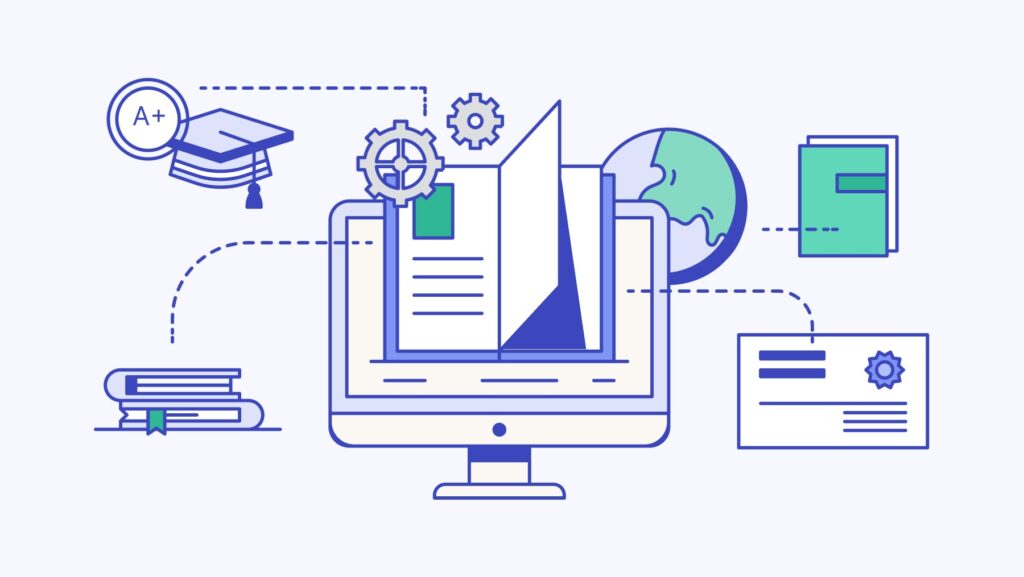5 Benefits of Using e-Learning in Today’s World

E-learning is a learning system that represents the delivery of educational material and learning through digital resources. It is provided through an internet connection on electronic devices such as tablets, computers, and smartphones. While this teaching approach wasn’t new for universities and courses that had already integrated technology, it was unfamiliar to institutions and regions where education primarily relied on face-to-face learning.
Importance of E-learning:
Recent times have boosted e-Learning Software Development globally, and now this system is also in practice in primary and secondary schools. One of the major benefits of online education is remote access to desired classes. Studying online comes with various benefits like widespread teaching materials. Organizations also incorporated e-learning into their existing systems and added technological advancements to make the most out of it. They were seen to invest in online management software like Jibble, Asana, Slack, and Workstack. In a recent survey, it was recorded that 51 percent of HR decision-makers claimed that the ongoing shift to e-learning had a direct impact on boosting employee morale, satisfaction, and longevity.
Benefits of e-Learning:
In order to understand the true scope and rise of e-Learning, it is important to dig deeper and gain insight into its benefits, and truly understand its features. This blog will emphasize 5 benefits of e-Learning that have had an impact on society for real. Keep scrolling!
1) Minimized Cost:
If compared with conventional learning, e-Learning is far more cost-effective and streamlined. It benefits the employees since they teach remotely and can easily save up on transportation, and the additional time it takes to get to their workplaces. Since in-person training is expensive, through e-Learning, institutes can save up on costs of paying an instructor’s travel time. Furthermore, it also provides a quick form of delivering lectures as compared to the traditional delivery of lectures. Through e-learning, teachers can pre-record lectures based on their convenience. The time required to learn is reduced by 25%- 60% if e-Learning is incorporated. This is also easier for the students and learners since they will be able to learn at their own pace by defining their speed of learning instead of following the speed of the whole group.
2) Consistency:
The method of online learning is best suited for everyone. This digital revolution of e-Learning has led to phenomenal changes in how lectures are delivered, assessments are conducted, and content is consumed. It has also proved to be extremely effective and consistent for students. E-learning provides students with a consistent and standardized form of learning. Students, irrespective of their location, and time zones will be receiving the same experience of learning online. The teachers will be given a higher degree of coverage to deliver and communicate with the students consistently.
3) Environment Friendly:
E-learning is a paperless procedure, and it does not contribute to numerous environmental issues linked with paper production. It has a direct impact on the minimization of using paper, minimizing carbon emissions, and consuming a lot of energy to run schools. It also promotes a friendly eco-system since there will be reduced usage of paper, and a reduced urge to cut trees. e-Learning might as well help us save our planet if we carry forward like this even after the pandemic.
4) Better Retention
A study found that e-learning makes learning 17% more effective. It is not surprising that students find digital learning far more engaging. It was said that learners now prefer specific, and interactive content as compared to clusters of notes and books. If students will enjoy learning, there is a greater chance that they will remember and apply the concepts later in life. It also helps students in retaining information for a longer time. Through a wide range of digital tools, e-learning has made the process of delivering content much more interactive and engaging.
5) Allows Learners to take lectures repeatedly:
E-Learning makes use of student data much more effectively than any other form of learning in history. That is because of E-Learning Analytics. E-Learning Analytics is the extraction of valuable information from online learning management systems, and it’s another one of the greatest benefits of e-Learning. With student data gained through e-Learning Analytics, educational institutions can improve their training materials and boost learning outcomes in various ways.
Important Factors to Know:
-
- E-learning is not only limited to students but working women, men, and children can also take lectures based on their convenience and availability because of the facility of recorded lectures. As a result of e-learning, lectures, notes, and other paraphernalia were made accessible all over the world. Depending on the elements of availability and comfort, many people could cover missed classes or work at their own convenience.
-
- Different kinds of LMS, social media, and flipped classroom models, e-learning has opened a wide range of connections for all learners. Discussion forums on VLE’s and LMS’ promote team collaboration and discussions as well. E-learning is probably the new future of learning. So, it’s time for students to save up and invest in those Kindles, and it’s time for organizations to get their LMS’ and VLE’s developed through competent software developers. Click here to view our e-learning plans.
To Sum Up:
It is not a surprise that e-Learning is becoming increasingly popular to the extent that people are having online convocation ceremonies. While there are claims that e-learning hinders productivity and increases screen time, the majority believe that it also increases interest and engagement in learners. It was stated by almost 72 percent of organizations that e-Learning enhanced their competitive edge. This is extremely beneficial since students can always revert back to lectures and recorded videos when they are revising for assessments. Conventionally, if you missed classes, it was harder to access the lecture at your own time.



